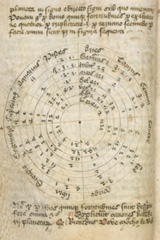 |
 |
 |
 |
 |
 |
 |
|
Richard Dove of Buckfast, a fifteenth-century scholar (3/3) In addition to soothsaying and alchemy, Dove’s notebook includes more traditional subjects such as French grammar. Knowledge of French was important, given that this was the language of law and that manuals of estate management were written in French.(43) It was thus preferable, if not essential, that any abbot or monastic official was proficient in French. Arithmetic and geometry also feature in the notebook. There are treatises on the measurement of land and the movement of the planets [above right]; instructions on weights and on how to measure the depth of wells as well as a table setting out Roman numerals with their Arabic equivalent. This practical information would have been useful for any abbot or monastic official involved in the administration of the abbey, who had to attend to litigation, measuring boundaries, accounting and computing dates.
A relatively small proportion of the notebook deals with specifically Cistercian matters. This includes prayers and extracts from the liturgy, oaths taken by scholars before they left their monastery for Oxford, as well as the profession of novices, the form of visitation and the statutes of Richard’s own monastery, Buckfast. The nature of this material certainly suggests that the owner was preparing himself for a high administrative post upon his return, perhaps even the abbacy.(44) |
|||
|
